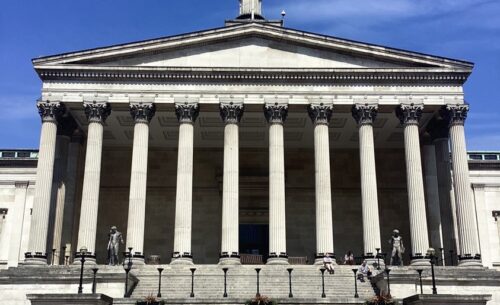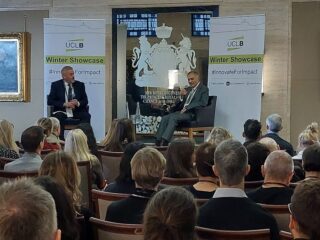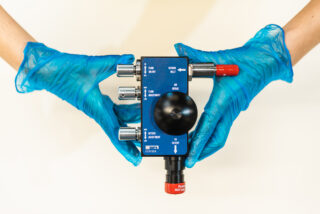UCLB
UCLB - 30 Years of Impact

For 30 years, UCLB has been supporting and developing innovations that emerge from the world-leading research at UCL. From cures for rare diseases, and innovative solutions to the climate crisis, to ground-breaking AI, and social enterprises, we are proud to have supported a vast range of innovations that have created impact across the world.
UCLB CEO, Anne Lane, has worked at UCL both as an academic in the early 1990s, and then on the commercial side from the early 2000s and has seen UCLB change dramatically since its inception, “It’s really evolved since then, we now have around 60 employees, including a core team of business managers, who are supported by a wider team who cover finance, legal and operations. We have the expertise that ensures a successful commercialisation process.”
Pioneering cures for rare diseases
Since 2018, five of UCLB’s spinouts have announced IPOs on Nasdaq, raising a total of $795.5m. These spinouts – Achilles Therapeutics, Autolus Therapeutics, Freeline Therapeutics, Meira GTx, and Orchard Therapeutics – are finding cures for cancer, developing treatments for long-term chronic diseases, and pioneering curative gene therapies. Their impact will help transform people’s lives in the long term, across the world.
UCLB has an outstanding track record in life sciences, which is not only demonstrated through our IPOs. In October 2022, Bloomsbury GTx was formally launched to develop potentially curative gene therapy treatments for rare neurological and metabolic diseases. Additionally, BioMarin’s ‘Roctavian’, which we licensed to them in 2013, was approved by the European Commission in August 2022, and is the first approved gene therapy for adults with severe haemophilia A.
Dr Richard Fagan, Director of BioPharm at UCLB said, “The success we have seen on the life science side at UCLB has been outstanding. Many of these spinouts have been in the works for years, including the haemophilia A licence to BioMarin which I started working on with Professor Amit Nathwani over 15 years ago. The world-leading research that emerges from UCL, in collaboration with the expertise at UCLB has created a portfolio of innovations that are changing people’s lives across the world.”

Finding solutions to difficult problems
The rapid growth of AI and engineering has facilitated the development of ground-breaking innovations that have the ability to transform our everyday lives, and create a better future for our world. Bramble Energy and Carbon Re are two UCLB spinouts that are finding solutions to the climate crisis, through the creation of hydrogen fuel cells, and an AI software that helps energy-intensive industries reduce their carbon emissions.
Satalia uses AI to help companies more efficiently solve complex problems of the type with which humans and traditional simulation techniques struggle. The company’s acquisition in 2021 by WPP, the world’s biggest advertising group, makes clear Satalia’s value as a ‘one-stop-shop’ for the kind of AI solutions which can give its customers an edge in everything from marketing to operations and delivery.
Similarly Senceive, whose wireless enabled remote condition monitoring solutions helped to improve operational efficiency and safety in the railway and construction industries, was acquired by Previan in 2021. Their acquisition demonstrates the value that university technology transfer can deliver over the long haul, nurturing innovative businesses through their entire lifecycle, and helping them to deliver both significant economic returns and societal impact.
Dr Steven Schooling, Director of Engineering and Physical Science at UCLB said, “Taking a research idea from UCL, and turning it into a successful business can be a very long journey. I worked with the Senceive team throughout their 16-year spinout journey, unlocking significant returns for all involved. Furthermore, with the engineering and physical science field evolving at a rapid pace, I’m really excited by the opportunity to unlock further successes for UCL and UCLB.”

Looking beyond economic impact
UCLB is not just focused on economic impact. UCLB was, in 2012, the first technology transfer office to appoint a dedicated Social Ventures Business Manager. UCLB’s social ventures support and proof of concept funding helps UCL researchers unlock impact from research that has a primary focus to make a difference to people’s lives, tackle environmental issues or meet community needs.
Examples of our work in this area include: technologies that can enhance the lives of people with disabilities; programmes for the prevention of childhood obesity; initiatives to prepare for future epidemics; a range of paints made from coal mine waste; and development of an online portal to help people manage their type 2 diabetes, which has been adopted by NHS England.
Analia Lemmo Charnalia, Social Ventures Business Manager at UCLB said, “We are delighted to continue supporting the development of social ventures as a further mechanism to translate UCL’s innovative knowledge base into products and services that can deliver substantive benefits to society.”

Thought leadership in IP commercialisation
UCLB’s impact goes even further still: in 2010, Marina Santilli, Associate Director of Engineering and Physical Science set up e-lucid, an online platform designed to remove the time-heavy, back-and-forth negotiations involved in the licensing of intellectual property (IP). With a tailored ‘storefront’, and customisation options, almost 20 universities now use the platform to avoid missing out on potentially significant income from IP commercialisation.
More recently, UCLB responded to the emerging challenges posed by COVID-19, and e-lucid helped take that one step further. The UCL-Ventura CPAP device was the result of a collaboration between UCL academics, UCLH doctors and Mercedes Formula One engineers, that had the potential to help COVID-19 patients across the world. The device also facilitated a perfect demonstration of e-lucid’s potential; a bespoke version of the platform was up and running within days. Within 48 hours of going live, it had received over 800 licence applications for the CPAP blueprints, and at its peak was handling two applications a minute.
Unique funding opportunities
An important element of UCLB’s activities is securing funding to progress the commercialisation of UCL’s innovation. Established in 2016, the UCL Technology Fund (UCLTF) with its unique model of proof of concept, spinout company and licensing project investment strategy has committed £54m into UCL projects. The collaboration between UCLB and Albion VC enables us to invest at an early stage and bring to market truly innovative technologies.
In June 2021, Apollo Therapeutics, a ground-breaking collaboration between three leading universities (UCL, Imperial College and University of Cambridge) and three global pharmaceutical companies (AstraZeneca, GlaxoSmithKline and Johnson & Johnson) which was set up in late 2015, received £100m in investment to further develop and translate early-stage science into clinical development for patient benefit.
Finally, to support early-stage translational projects and spinout companies that have promising commercial potential, but which fall outside the UCLTF investment criteria, UCLB has recycled a proportion of the proceeds secured from some recent spinout exits, in order to create a seed investment fund. The seed fund seeks to widen the investment support that UCLB can provide to promising opportunities emerging from the UCL research base.
Anne Lane, who has seen the technology transfer space evolve, knows how important it is to continue to open up more opportunities for investment: “Commercialisation needs to be quick, and when I joined UCLB in 2000, we didn’t have the tools or infrastructure to move at speed. Once we were set up as a separate company, we were able to become much more agile. This enabled us to set up funding opportunities such as UCLTF, through which we can invest at a much earlier stage; we’re able to take risks in investment that universities cannot.”

Behind every spinout are individual stories of impact. Whether it’s through life-saving gene therapies, pioneering technologies, or community projects, there are people across the world who have been positively impacted by the work we do alongside UCL researchers and academics.
The next 30 years
Geraint Rees, Vice-Provost of Research, Innovation and Global Engagement at UCL commented, “Innovation often requires a lot of patience, and UCLB has needed that patience to nurture the companies, businesses and social enterprises it supports today. A recent report has shown that UCL has an annual economic impact of £9.9bn, which is the same impact that was generated by the London Olympics, but every single year. However, behind those numbers are individual stories of individual impacts, and it’s those stories that tell us the true impact of the collaboration between UCL and UCLB.”
The last 30 years have seen a huge range of innovations supported by UCLB, and Anne Lane is looking ahead to the next three decades, “We want to expand, and maximise what we find at UCL. A more diverse portfolio is what we’re after, with an increased focus on engineering and computer science, as well as nurturing social ventures, which doesn’t generate huge profits, but creates huge impact. Being able to translate research from UCL into innovations that change people’s lives is what is at the heart of UCLB – thank you to everyone who has contributed to our success.”
Being able to translate research from UCL into innovations that change people’s lives is what is at the heart of UCLB - thank you to everyone who has contributed to our success.”